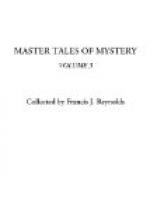As for the others, the men who had cloaked conspiracy with a woman’s smile, he would know how to deal with them. Indeed, when he scanned their faces and began to remember the circumstances under which he had met them before, his courage was strengthened, and he forgot that he had ever reasoned with it.
He stood in the shadows; but the four, close in talk, and thinking that a lackey had entered the room, did not observe him. They were laughing merrily at some jest, and filling the long goblets with the golden wine of Cyprus, when at last he strode out into the light and spoke to them. His heart beat quickly; he knew that this might be the hour of his death, yet never had his voice been more sonorous or more sure.
“Countess,” he exclaimed, as he stepped boldly to the table and confronted them, “I bring you a message from Andrea, the lord of Pisa!”
He had expected that the woman would cry out, or that the men would leap to their feet and draw their swords; but the supreme moment passed and no one spoke. A curious silence reigned in the place. From without there floated up the gay notes of a gondolier’s carol. The splash of oars was heard, and the low murmur of voices. But within the room you could have counted the tick of a watch—almost the beating of a man’s heart. And the woman was the first to find her tongue. She had looked at the friar as she would have looked at the risen dead; but, suddenly, with an effort which brought back the blood to her cheeks, she rose from her seat and began to speak.
“Who are you?” she asked; “and why do you come to this house?”
Fra Giovanni advanced to the table so that they could see his face.
“Signora,” he said, “the reason of my coming to this house I have already told you. As to your other question, I am the Capuchin friar, Giovanni, whom you desired your servant Rocca to kill at the church of San Salvatore an hour ago.”
The woman sank back into the chair; the blood left her face; she would have swooned had not curiosity proved stronger than her terror.
“The judgment of God!” she cried.
Again, for a spell, there was silence in the room. The priest stood at the end of the table telling himself that he must hold these four in talk until the bells of San Luca struck ten o’clock, or pay for failure with his life. The men, in their turn, were asking themselves if he were alone.
“You are the Capuchin friar, Giovanni,” exclaimed one of them presently, taking courage of the silence, “what, then, is your message from the Count of Pisa?”
“My message, signore, is this—that at ten o’clock to-night, the Count of Pisa will have ceased to live.”
A strange cry, terrible in its pathos, escaped the woman’s lips. All had risen to their feet again. The swords of the three leaped from their scabbards. The instant of the priest’s death seemed at hand. But he stood, resolute, before them.




